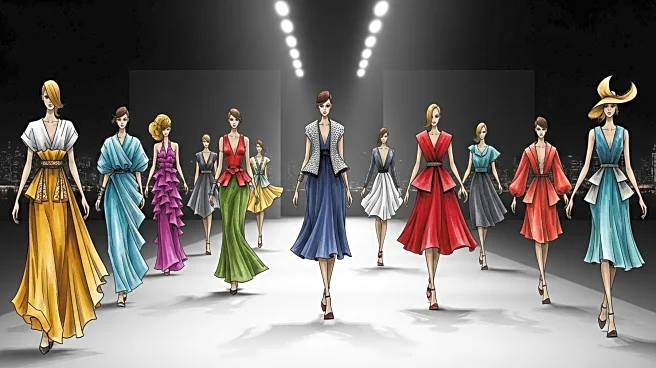What's Happening?
The Fashion Institute of Technology (FIT) recently showcased its 2025 Fashion Designer Master of Fine Arts graduate runway show at the Art & Design Gallery in New York. Eighteen emerging designers presented collections that emphasized themes such as family, space, and motherhood. The show marked the culmination of a two-year program where students conducted research leading to the creation of eight-look collections, thesis papers, and presentations. The event featured innovative designs focusing on detailing, textures, upcycled materials, and craftsmanship. The show was part of New York's Fashion Week, offering the designers a platform to display their talents to industry leaders.
Why It's Important?
The FIT Fashion Design MFA Show is significant as it provides a platform for emerging designers to launch their careers in the competitive fashion industry. By participating in New York's Fashion Week, these designers gain exposure to influential figures in the fashion world, potentially leading to future collaborations and opportunities. The emphasis on creativity and craft reflects broader trends in the industry towards sustainable and innovative design practices. This event also highlights the importance of educational programs in nurturing new talent and fostering creativity, which can drive the future of fashion.
What's Next?
Following the show, the designers are expected to continue developing their brands and collections, leveraging the exposure gained from the event. As they enter the fashion industry, they may seek partnerships with established brands or pursue independent ventures. The success of the show could lead to increased interest in FIT's MFA program, attracting more aspiring designers to enroll. Additionally, the themes explored in the collections may influence future fashion trends, encouraging other designers to incorporate similar elements into their work.
Beyond the Headlines
The show not only highlights the creativity of the designers but also raises questions about the role of cultural and familial influences in fashion design. As designers explore personal themes, they contribute to a broader dialogue about identity and expression in the fashion industry. The use of upcycled materials and sustainable practices reflects a growing awareness of environmental issues, suggesting a shift towards more responsible fashion production. This trend may lead to long-term changes in how fashion is created and consumed.









